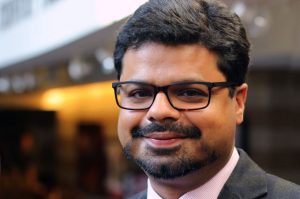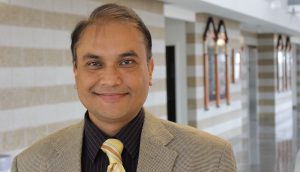Somnath Lahiri, a member of the Illinois State University management and quantitative methods (MQM) faculty, described receiving his United States citizenship March 22 as “a dream fulfilled.”
He was joined in the naturalization ceremony by about 50 other people —“all happy and smiling”—including his wife, Susmita. Their son, Soumit, received his citizenship a few weeks before.

Avimanyu Datta, associate professor and director, Means Center for Entrepreneurship
Fellow MQM professor Avimanyu Datta described completing his own path to becoming a United States citizen as “a very nice feeling.” Along with his wife, Priyanka, who works as an academic advisor in University College, he took his citizenship oath last September as part of one of the largest ceremonies in Central Illinois history. The event took place at Peoria’s Bradley University and involved nearly 700 immigrants from 80 different countries.
Both professors are originally from India and shared the process of applying for citizenship was quite streamlined.
“You do the right things, wait for the right time, and things happen,” said Lahiri. “It’s not that cumbersome.”
The first major step is receiving permanent resident status. After that, there is a wait period of about five years before someone can apply for citizenship. For many people, meeting the requirements for becoming a permanent resident proves to be the most challenging hurdle and it can take as many as eight to ten years to receive.
Thanks to their commitment to outstanding research and scholarship, however, the ISU professors qualified for a shorter application process because they met the criteria for employment-based immigration requirements.
“There’s a concept called ‘outstanding professors and researchers.’ If you can qualify yourself in that area, in that particular category, you can get your permanent residence or green card in less than a year,” said Datta. “There are some hurdles. For instance, you have to get about a dozen recommendation letters from people you have not worked with, but they know about your work, so that takes a long time. So maybe you reviewed for somebody or maybe somebody famous read your work and then you can contact them. Some people say, ‘No.’ some people say, ‘Yes.’ It took some time to essentially gather all those letters.”
For both men, their patience and hard work in the realm of research paid off and made it possible for them to utilize the quicker path to permanent residency.
Datta, who teaches strategic management and entrepreneurship, shared the research focus which helped him to achieve his citizenship has been on innovations.
“I work on concepts like radical innovations when firms try to bring products that are very different from what they did earlier. I also work on a type of innovation called foundation innovation, which is when a firm creates something that creates a lot of value for other firms,” he said.

Somnath Lahiri, professor, Department of Management and Quantitative Methods
His colleague, Lahiri, observed, “My research always deals with strategy and international business combined.”
Some of his areas of interest include emerging markets, outsourcing strategy, corporate acquisition, family business internationalization, and innovation.
The professor also noted his experience of immigrating to the United States from India has given him a unique perspective that enriches the international business classes he teaches at ISU.
While giving up their Indian citizenship has been somewhat bittersweet, the professors both shared they have long felt a connection with the country where they have chosen to live and work.
“As you stay in the U.S. and as you meld with the population and the crowd and the culture and everything, in your mind you really become an American,” Lahiri said.
Datta added, “The fact is, ever since we moved to America—my wife and I came separately—it always felt like home. There’s a lot of freedom that people have. It was a missing part that we could not vote because we were not citizens.”
In addition to exercising their newfound voting rights as citizens, the men are looking forward to having a greater ease of travel.
“As international business professors and scholars, we have to go from time to time to overseas conferences, and it has always been a cumbersome thing because I had to get a visa,” Lahiri said. “Any time I went even to London or even Canada for example, we had to go to the consulate in Chicago and apply, pay the fees, send the passport. From now onwards, I won’t have to worry about visas. Next time I come back (through airport customs) I’ll be joining the queue that says, ‘Citizens.’”

